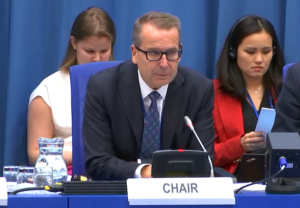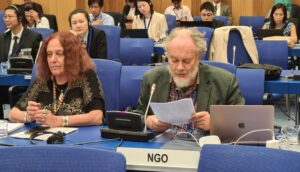“The risk of nuclear war by accident, miscalculation or crisis escalation has become as high today as it has ever been – including during the most tense times of the Cold War”, according to a memo and open letter sent last week to world governments by People for Nuclear Disarmament, the Human Survival Project, World Future Council, Abolition 2000 Nuclear-Risk-Reduction Working Group and other members of NoFirstUse Global. “This makes nuclear risk reduction a vital issue for governments to address in the 76th Session of the UN General Assembly which opens this week in New York.”
The letter calls in particular on world leaders and UN delegates to use the occasion of the UNGA General Debate from Sep 21-27, the UN High Level Meeting on the Total Elimination of Nuclear Weapons on September 28 and the deliberations of the UN Disarmament and International Security Committee from Oct 4 – Nov 4, 2021 to:
“Affirm the Reagan/Gorbachev dictum that a nuclear war cannot be won and must never be fought, support the adoption by nuclear armed states of no-first-use policies as an important measure to reduce the risk of a nuclear war and as a transformational measure to pave the way for more comprehensive nuclear disarmament, and affirm the goal of the global elimination of nuclear weapons no later than 2045, the 100th anniversary of the UN.”
In highlighting the increased risks of nuclear war, the letter and memo cite research and analysis undertaken by the Bulletin of Atomic Scientists, which in January 2021 set the Doomsday Clock to 100 Seconds to Midnight as an indication of the level of nuclear risk. The Bulletin noted that “Governments in the United States, Russia, and other countries appear to consider nuclear weapons more-and-more usable, increasing the risks of their actual use. There continues to be an extraordinary disregard for the potential of an accidental nuclear war, even as well-documented examples of frighteningly close calls have emerged.”
A range of nuclear risk reduction measures are promoted in the memo including de-alerting, increased transparency, improved mil to mil communication (hotlines) and avoidance of provocative military exercises and movements. However, NFU is advanced as being probably the most important:
“If in a confrontation between any two countries, it is known that each country has both a doctrine and a ‘built – in’ posture of No First Use, (or ‘Sole Purpose’) the likelihood of that confrontation escalating to nuclear weapons use will be low to zero. On the contrary, confrontations between countries that do NOT each have NFU postures and policies… carry a substantial risk of uncontrollable escalation to nuclear weapons use.”
The memo also notes that No First Use or Sole Purpose policies are important not only to reduce the risk of nuclear war, but also to pave the way for comprehensive nuclear disarmament:
“As long as the role of nuclear weapons includes addressing a range of threats from other WMD, conventional weapons and even cyber-attacks, the nuclear armed states will not agree to nuclear disarmament negotiations. Once nuclear armed state states have restricted the role of nuclear weapons to deterring from other nuclear weapons, then they are able to join such negotiations and support a framework for verified elimination.”
The memo was drafted and sent to UN members by the following Steering Committee Members of NoFirstUse Global: John Hallam, People for Nuclear Disarmament (Sydney Australia); Prof. Frank Hutchinson, Human Survival Project (Sydney Australia); Marc Finaud, Co-Convenor, Abolition 2000 Risk Reduction Working Group (Geneva); Aaron Tovish, Zona Libre (Mexico/Manila); Carlo Trezza, Former Ambassador for Disarmament and Non Proliferation, Member of the Scientific Committee of the Union of Italian Scientists for Disarmament (Rome) and Alyn Ware, World Future Council (Prague).
UN Photo/Manuel Elias





